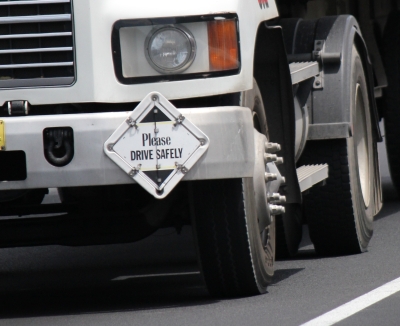Transport chief slams national heavy vehicle slip
 Victorian Transport Association (VTA) CEO Neil Chambers has opened fire on an error in the Heavy Vehicle National Law (HVNL), which he says is impossible to comply with and could lead to legal action.
Victorian Transport Association (VTA) CEO Neil Chambers has opened fire on an error in the Heavy Vehicle National Law (HVNL), which he says is impossible to comply with and could lead to legal action.
Mr Chambers has unleashed on the National Heavy Vehicle Regulator’s (NHVR) expansion of the “evidence of accreditation” requirement, which now reaches beyond operators enrolled in the National Heavy Vehicle Accreditation Scheme (NHVAS) for Mass Management and Maintenance Management.
In less than a week the new laws will be enforced in Victoria, Queensland, New South Wales, Tasmania and South Australia, including a stipulation that a copy of the accreditation certificate and a letter signed by the operator stating that the driver has been inducted into the relevant management system, will need to be available for drivers.
Chambers says the requirement is impossible for many, and could spark a class action.
“Under existing State-based road law, such a requirement is only necessary for operators enrolled in the NHVAS Fatigue Management module,” Mr Chambers said.
“But, due to a drafting error, which went unnoticed through the legislative process, the requirements have been extended to the other components of the NHVAS as well.
“The industry, through the VTA, the ATA, and our counterpart associations in other States, has continuously brought this error to the attention of the National Heavy Vehicle Regulator (NHVR) and to State Governments and existing road agencies.
“Yet, on the cusp of the implementation of the HVNL from next Monday, our requests for the costly consequences of this additional regulatory burden to be averted have not been heeded.
“The galling aspect of this is that it will not improve safety one little bit. Instead, hundreds of operators will need to produce and distribute thousands of letters and other pieces of paper to drivers at considerable cost and administrative burden.
“Under the new national law, drivers face infringement notices of $300 for failing to carry the documents, and operators face a maximum fine of $3,000 per offence.”
The NHVR has issued a statement that it has been; “advising transport enforcement agencies that their authorised officers should apply discretion where drivers are unable to produce the required NHVAS documentation when they are intercepted. This may include the issuing of a warning as opposed to an infringement”.
“This falls well short of the actions the industry is looking for to solve this problem,” Mr Chambers said in response.
“Mealy mouthed words such as ‘apply discretion’ or ‘may issue a warning’ leave the industry with a cold feeling that enforcement will not be consistent on this matter.
“Even with the best intentions by many larger operators to prepare to comply this week, the shear logistics of producing the documentation and physically getting the paperwork to drivers will mean that come next Monday, many drivers working for operators under NHVAS Mass or Maintenance accreditation will not have the documents in their truck.
“In some instances, drivers are now on the road and will not return to a place where the documents can be distributed to them before next Monday.
“We all want the new NHVR to work, and to deliver the promised cost and productivity improvements over time. But, to kick off the new laws with additional red tape and costs, for no productivity or safety benefit, is hard to swallow.”








 Print
Print